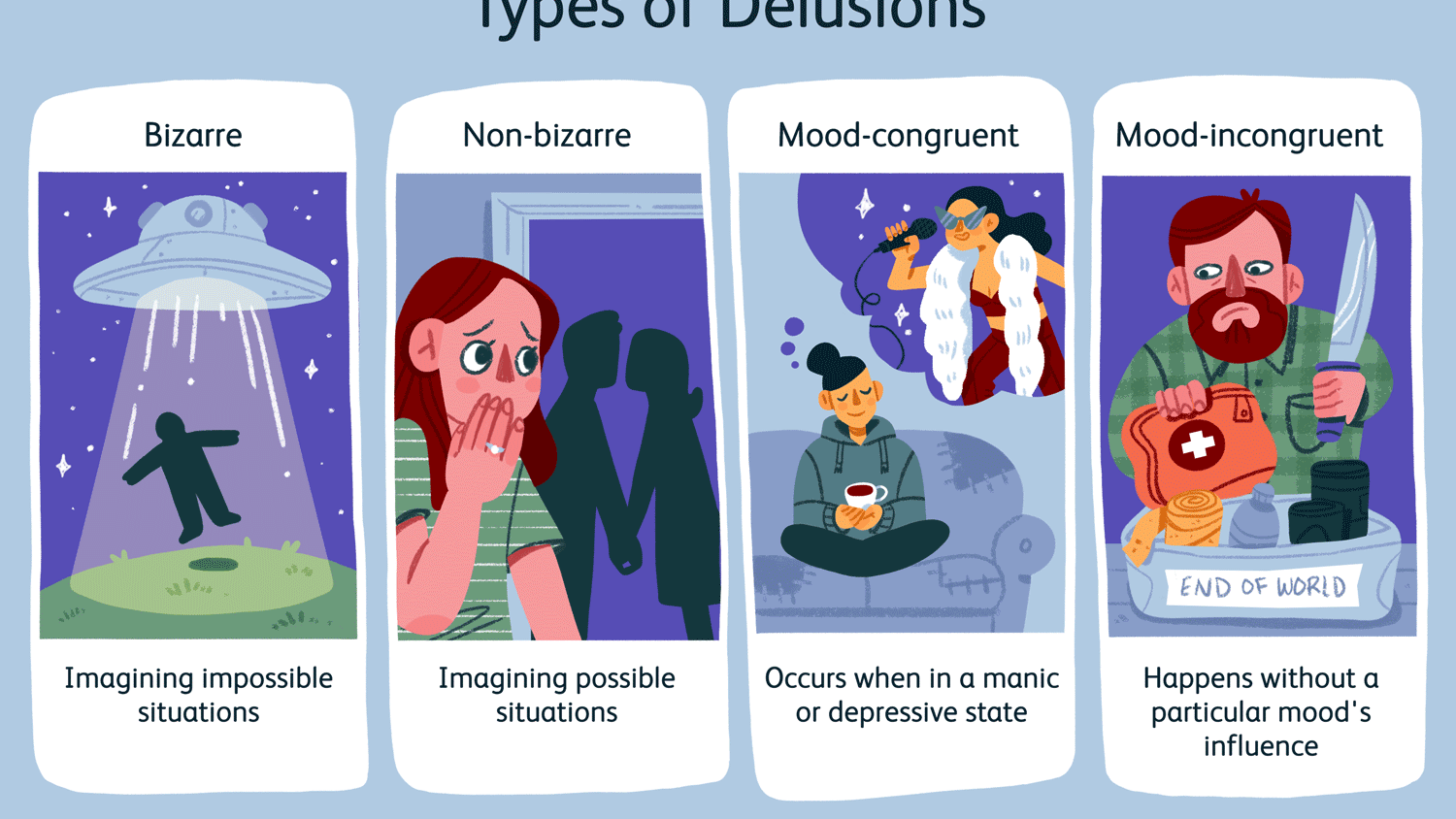PSYCHOSIS
WHAT IS IT?
Psychosis is when people lose some contact with reality. This might involve seeing, smelling, feeling or hearing things that other people cannot see or hear (hallucinations) and believing things that are not actually true (delusions).
Psychosis can be a very difficult or frightening experience. You may find that it:
-
Affects your behaviour or disrupts your life
-
Makes you feel very tired or overwhelmed
-
Makes you feel anxious, scared, threatened or confused
-
Leaves you finding it very difficult to trust some organisations or people.
Psychosis can also be triggered by:
-
A traumatic experience
-
Stress
-
Drug misuse
-
Alcohol misuse
-
Side effects of a prescribed medicine
-
A physical condition, such as a brain tumour
How often a psychotic episode occurs and how long it lasts can depend on the underlying cause. Psychosis affects people in different ways. You might experience it once, have short episodes throughout your life, or live with it most of the time.
WHAT ARE SOME OF THE COMMON SYMPTOMS?
The 2 main symptoms of psychosis are:
-
Hallucinations – where a person hears, sees and, in some cases, feels, smells or tastes things that do not exist outside their mind but can feel very real to the person affected by them; a common hallucination is hearing voices
-
Delusions – where a person has strong beliefs that are not shared by others; a common delusion is someone believing there's a conspiracy to harm them
The combination of hallucinations and delusional thinking can cause severe distress and a change in behaviour.
Experiencing the symptoms of psychosis is often referred to as having a psychotic episode.
It's sometimes possible to identify the cause of psychosis as a specific mental health condition, such as:
-
Schizophrenia – a condition that causes a range of psychological symptoms, including hallucinations and delusions
-
Bipolar disorder – a mental health condition that affects mood; a person with bipolar disorder can have episodes of low mood (depression) and high or elated mood (mania)
-
Severe depression – some people with depression also have symptoms of psychosis when they're very depressed
WHAT ARE SOME OF THE TYPES OF TREATMENT?
Treatment for psychosis will vary, depending on the underlying cause. You'll receive specific treatment if you've been diagnosed with an underlying mental health condition as well.
Treatment for psychosis involves using a combination of:
antipsychotic medicine – which can help relieve the symptoms of psychosis:
WHAT CAN HELP?
'Self-help' tips don't solve the issue. However, they can help you/others feel more in control when experiencing strong emotions.
If you find that 'self-help' isn't enough, consider reaching out to a counsellor or your GP for help managing overwhelming emotions.
01
Peer support. Connect with others who can support you. Even peer support groups which can bring people together who have similar experiences to support each other.
02
Recognise triggers.Once you have a better understanding of your triggers, you can try to take steps to avoid or manage them. If you learn to recognise your warning signs, you can take action early to try and prevent your psychosis getting worse.
03
Learn to relax. Take time to manage stress and try some relaxation techniques. Taking part in physical activities that you enjoy. This will help with your wellbeing
04
Try to get enough sleep. Sleep can help give you the energy to cope with difficult feelings and experiences. See our pages on coping with sleep problems.
05
Think about your diet. Eating regularly and keeping your blood sugar stable can make a difference to your mood and energy levels. See our pages on food and mood.
06
Try to do some physical activity. Exercise can be really helpful for your mental wellbeing. See our pages on physical activity.
07
Spend time outside. Spending time in green space can boost your wellbeing. See our pages on nature and mental health.
08
Avoid drugs and alcohol. While you might want to use drugs or alcohol to cope with difficult feelings, in the long run they can make you feel a lot worse and can prevent you from dealing with any underlying problems that the drug or alcohol use may have been masking. See our pages on recreational drugs and alcohol.
09
Create a crisis plan. When you are in a crisis this won't be easy so it is better to prepare. This can include information on triggers, early warning signs, medication and effect ways for others to help you
10
Do not suddenly stop your medication. This can cause a relapse of your symptoms. Speak with your medical team before making any changes to your medication.
-
psychological therapies – the 1-to-1 talking therapy cognitive behavioural therapy (CBT) has proved successful in helping people with psychosis, and family interventions (a form of therapy that may involve partners, family members and close friends) have been shown to reduce the need for hospital treatment in people with psychosis
-
social support – support with social needs, such as education, employment or accommodation
-
Some people are recommended to take antipsychotics on a long-term basis (and possibly for the rest of their lives). Other people may be able to gradually reduce their dosage and then stop taking them altogether if there is a marked improvement in symptoms.
EXTERNAL INFORMATION, SUPPORT AND ADVICE






















































 |  |  |
|---|---|---|
 |  |  |
 |  |  |
 |  |  |
 |  |  |
 |  |  |
 |  |  |
 |

